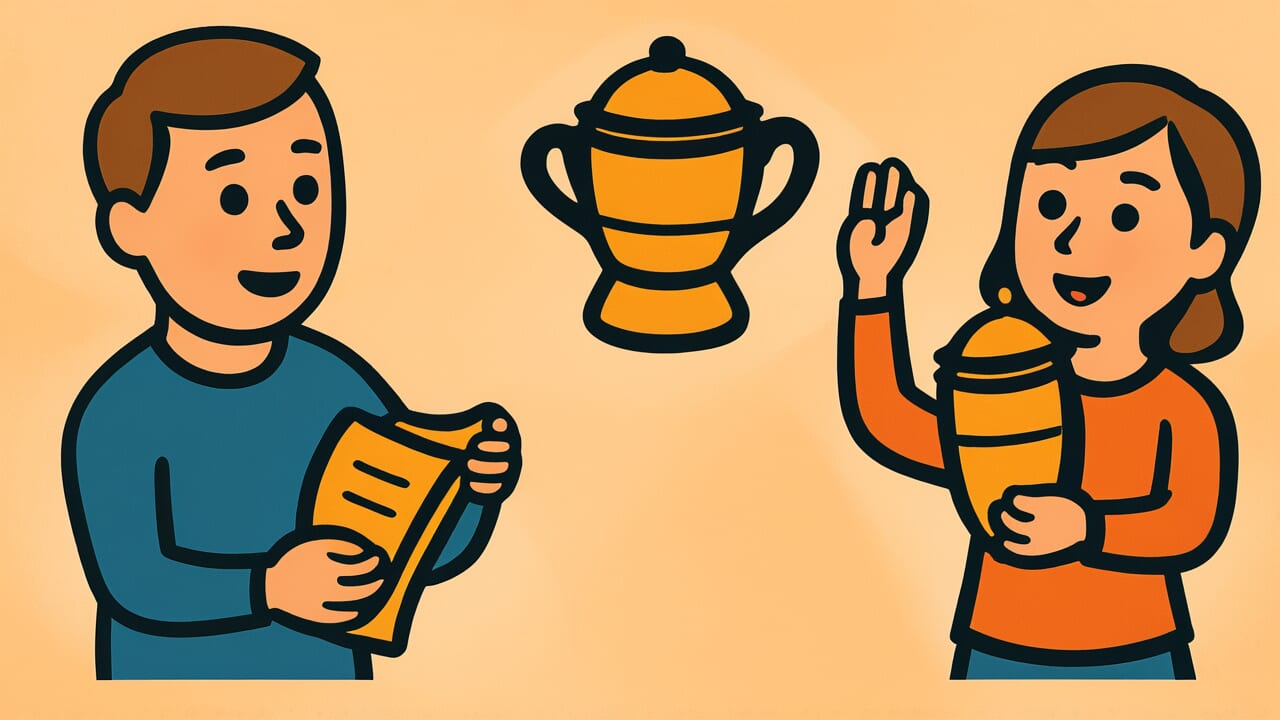How to Read “A parent’s things are a child’s things, a child’s things are a parent’s things”
Oya no mono wa ko no mono, ko no mono wa oya no mono
Meaning of “A parent’s things are a child’s things, a child’s things are a parent’s things”
This proverb shows that ownership between parents and children is unclear. They can freely use each other’s belongings.
When a parent uses something the child owns, or when a child uses something the parent owns, both are accepted as natural. This reflects a close and intimate relationship.
People use this expression when family members borrow things from each other. It also describes situations where parents and children share property.
For example, a child might borrow a parent’s clothes. Or a parent might use something from the child’s room. This proverb treats these actions as normal, not as problems.
Even today, parents and children living together often share things. Food in the refrigerator and daily necessities belong to everyone, not to one person.
This proverb positively expresses family unity. It shows the comfortable closeness where no one needs to hold back.
Origin and Etymology
The exact first written record of this proverb is unclear. However, people have used it for a long time to reflect traditional Japanese family values.
Before the Edo period, the household was the basic unit of Japanese society. The concept of family property was stronger than individual ownership.
The boundary of ownership between parents and children was especially unclear. Money earned by parents and things obtained by children all belonged to the household.
The structure of this saying is interesting. The first half and second half switch the subject and object. This creates a parallel expression.
It doesn’t just say “a parent’s things are a child’s things.” It also says “a child’s things are a parent’s things.” This emphasizes the two-way relationship.
This isn’t about one-sided control. It shows the family as a community where parents and children support each other.
This expression also reflects Confucian family values. Parents and children form one unit. They should not be seen as separate beings.
This idea existed before Western concepts of individual property rights came to Japan. The proverb expresses the natural relationship within Japanese families of that time.
Usage Examples
- When I went home, my parent was wearing my clothes. But “a parent’s things are a child’s things, a child’s things are a parent’s things,” so I don’t mind.
- I borrowed tools from my son’s room. “A parent’s things are a child’s things, a child’s things are a parent’s things,” so there’s no problem.
Universal Wisdom
This proverb has been passed down because it asks a fundamental question. What does family mean to human beings?
We humans cannot survive without someone’s care from the moment we’re born. A baby depends on everything the parent has. As the child grows, they eventually support the parent in return.
In this cycle, the concept of ownership may actually be meaningless.
The essence of the parent-child bond is giving to each other and supporting each other. Parents give generously to their children. Children naturally receive this.
Then, as time passes, children give back to their parents. In this flow, drawing a line about whose things are whose feels unnatural.
This proverb reveals a truth. True family exists beyond ownership. You cannot measure love through money or possessions.
Rather, the relationship where you don’t need to claim “this is mine” is filled with the deepest trust and security.
Humans cannot live in isolation. We seek deep connections with others and relationships where we can depend on each other.
The parent-child relationship is the most original and pure form of this. This proverb reflects humanity’s natural desire for community and the wish to be accepted unconditionally.
When AI Hears This
In the tragedy of the commons, everyone prioritizes their own interests and exhausts shared resources. But in families, the opposite happens.
Even though ownership is unclear, resources are protected. Cooperation actually emerges.
Game theory can explain this mechanism through “infinitely repeated games.” Parent-child relationships aren’t one-time transactions. They continue for decades.
If a child takes money from a parent’s wallet today without permission, trust collapses tomorrow and the child also loses. Conversely, if parents respect the child’s belongings, the child will likely care for the parents in the future.
This “expectation of the future” creates an equilibrium where neither side exploits the other.
What’s more interesting is that this unclear ownership enables “flexible resource allocation.” When a child suddenly needs money, strict ownership creates negotiation costs for borrowing.
But with the premise that “a parent’s things are a child’s things,” resources can move immediately according to the situation. This follows the same principle as companies finding better overall efficiency when departments share budgets flexibly rather than dividing them strictly.
The family, as the smallest unit, maximizes cooperation by turning unclear ownership to its advantage. This is a truly rational strategy that humanity has developed.
Lessons for Today
This proverb teaches us that with truly important people, detailed boundaries aren’t necessary. Modern society emphasizes individual rights and ownership.
But when this goes too far, we can build walls even within families.
Can your family rely on each other easily? If you often claim “this is mine, so,” take a moment to think.
Family should be the most secure place in life. It’s where you can support each other beyond such boundaries.
Of course, privacy and respecting individuals matter. But at the same time, having a relationship where you can ask for help without hesitation is equally valuable.
It’s natural and beautiful for parents to borrow their children’s strength. It’s equally natural for children to depend on their parents.
This proverb reminds us of the essence of family bonds. Rather than seeking perfect fairness, we should give to each other, sometimes depend, sometimes support.
Building such flexible and warm relationships leads to true richness.



Comments